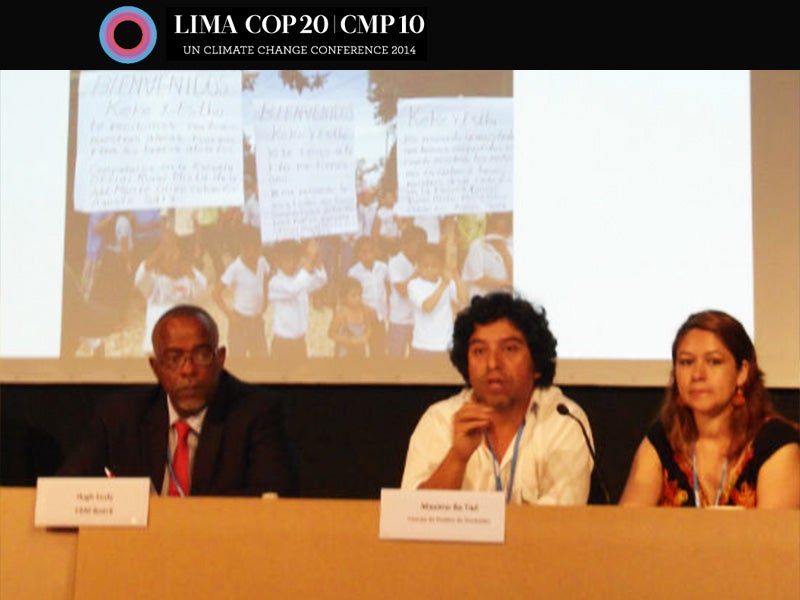Protecting Human Rights in All Climate Actions
Some clean development projects aimed at combating climate change cause grave human rights violations.

This page was published 11 years ago. Find the latest on Earthjustice’s work.
This guest blog post is from Victor Quintanilla, a Bolivian writer who works for AIDA and is attending the events in Lima. Earthjustice is a founding partner of AIDA, an organization that uses the law to protect the right to a healthy environment in the Americas, with a focus on Latin America.
Originally published in Spanish and English on the AIDA website.
All countries have an obligation to fight climate change, but they must also protect the human rights of their people. Unfortunately, some clean development projects aimed at combating climate change cause grave human rights violations—an issue that was recently discussed during a side event at the COP20 in Lima, Peru. (Check out all of Earthjustice’s COP20 coverage.)
Co-hosted by AIDA, the Center for International Environmental Law (CIEL) and Carbon Market Watch, participants of the event focused primarily on lessons learned from a market-based mechanism known as the Clean Development Mechanism or CDM, a central feature of the Kyoto Protocol that was designed to help countries meet their emissions targets.
During the event, Máximo Ba Tiul, a representative of the Tezulutlán Indigenous Council of Guatemala, spoke of the grave impacts of the Santa Rita hydroelectric project. Registered under the CDM of the United Nations Framework Convention on Climate Change, the so-called clean development project has caused human rights violations, including the death of children, in at least 20 surrounding communities. Santa Rita was also approved without consulting or obtaining the free, prior and informed consent of affected populations, shirking international standards. Hugh Sealy, president of the CDM board, replied that he was “disturbed” to hear that a CDM-registered project had allegedly violated human rights.
“All countries must respect human rights,” said Niranjali Amerasinghe, director of the Center’s Climate & Energy Program, during the event.
He explained that the connection between climate change and human rights, or, more precisely, the impact of one on the other, has been recognized in previous climate agreements, such as those drafted at COP16 in Cancun, Mexico. Amerasinghe advocated for consistency within the convention in terms of applying social and environmental safeguards and highlighted the importance of continuing to include the obligation to respect human rights in any agreements made at this COP.
Andrea Rodriguez, an AIDA senior attorney, spoke of the importance of implementing such safeguards, particularly with respect to the Green Climate Fund, which must adopt the strictest standards in the design of their social and environmental safeguards. Only in this way can they ensure that projects financed won’t cause harm to the environment or violate human rights.
Rodriguez added that the best international standards must be applied to projects at every phase of development, along with ongoing evaluation to learn from mistakes and to choose the most effective tools.
During its first three years of operation, the Green Climate Fund will use the standards of the International Finance Corporation (IFC), which Rodriguez considers “insufficient for preventing harm.” Although applying the standards used to date by the IFC is better than having no standards at all, many communities and ecosystems continue to suffer harms caused by projects with IFC financing.
Ba Tiul noted that the challenge is for all United Nations entities to honor differences and respect human rights. Amerasinghe added that projects registered with mechanisms like the CDM should be monitored throughout implementation, not just during the initial consultation and approval phases. And, faced with allegations of human rights abuses, he said, authorities must not hesitate to undertake an investigation.
At the conclusion of the event, Sealy thanked the participants for the information provided and promised to do everything possible to strengthen the Clean Development Mechanism consultation process.
For more information from COP20 from AIDA, visit aida-cop.org.
The International Program partners with organizations and communities around the world to establish, strengthen, and enforce national and international legal protections for the environment and public health.